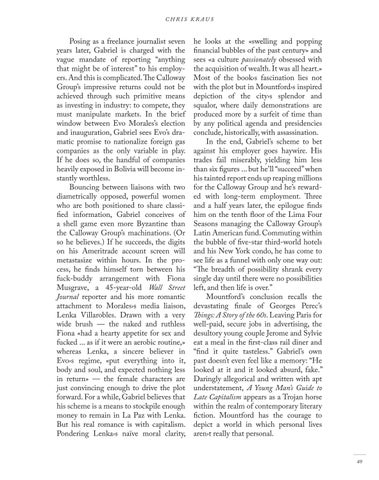CHRIS KRAUS
Posing as a freelance journalist seven years later, Gabriel is charged with the vague mandate of reporting “anything that might be of interest” to his employers. And this is complicated. The Calloway Group’s impressive returns could not be achieved through such primitive means as investing in industry: to compete, they must manipulate markets. In the brief window between Evo Morales’s election and inauguration, Gabriel sees Evo’s dramatic promise to nationalize foreign gas companies as the only variable in play. If he does so, the handful of companies heavily exposed in Bolivia will become instantly worthless. Bouncing between liaisons with two diametrically opposed, powerful women who are both positioned to share classified information, Gabriel conceives of a shell game even more Byzantine than the Calloway Group’s machinations. (Or so he believes.) If he succeeds, the digits on his Ameritrade account screen will metastasize within hours. In the process, he finds himself torn between his fuck-buddy arrangement with Fiona Musgrave, a 45-year-old Wall Street Journal reporter and his more romantic attachment to Morales›s media liaison, Lenka Villarobles. Drawn with a very wide brush — the naked and ruthless Fiona «had a hearty appetite for sex and fucked ... as if it were an aerobic routine,» whereas Lenka, a sincere believer in Evo›s regime, «put everything into it, body and soul, and expected nothing less in return» — the female characters are just convincing enough to drive the plot forward. For a while, Gabriel believes that his scheme is a means to stockpile enough money to remain in La Paz with Lenka. But his real romance is with capitalism. Pondering Lenka›s naïve moral clarity,
he looks at the «swelling and popping financial bubbles of the past century» and sees «a culture passionately obsessed with the acquisition of wealth. It was all heart.» Most of the book›s fascination lies not with the plot but in Mountford›s inspired depiction of the city›s splendor and squalor, where daily demonstrations are produced more by a surfeit of time than by any political agenda and presidencies conclude, historically, with assassination. In the end, Gabriel’s scheme to bet against his employer goes haywire. His trades fail miserably, yielding him less than six figures ... but he’ll “succeed” when his tainted report ends up reaping millions for the Calloway Group and he’s rewarded with long-term employment. Three and a half years later, the epilogue finds him on the tenth floor of the Lima Four Seasons managing the Calloway Group’s Latin American fund. Commuting within the bubble of five-star third-world hotels and his New York condo, he has come to see life as a funnel with only one way out: “The breadth of possibility shrank every single day until there were no possibilities left, and then life is over.” Mountford’s conclusion recalls the devastating finale of Georges Perec’s Things: A Story of the 60s. Leaving Paris for well-paid, secure jobs in advertising, the desultory young couple Jerome and Sylvie eat a meal in the first-class rail diner and “find it quite tasteless.” Gabriel’s own past doesn’t even feel like a memory: “He looked at it and it looked absurd, fake.” Daringly allegorical and written with apt understatement, A Young Man’s Guide to Late Capitalism appears as a Trojan horse within the realm of contemporary literary fiction. Mountford has the courage to depict a world in which personal lives aren›t really that personal. 49





























